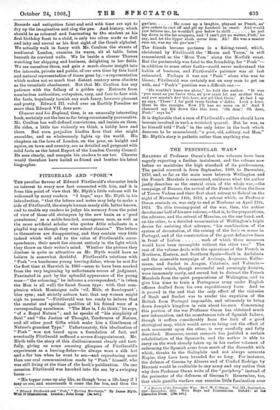FITZGERALD AND "POSH."*
THE peculiar flavour of Edward FitzGerald's character lends an interest to every new fact connected with him, and it is from this point of view that Mr. Blyth's little volume will be welcomed by many readers. "I hope," says Mr. Blyth in his introduction, "that the letters and notes may help to make a side of FitzGerald, the simple human manly side, better known, and to enable my readers to judge his memory from the point of view of those old shrimpers by the new basin as a 'good gennleman,' as a noble-hearted, courageous man, as well as the more artificial scholar who quotes Attic scholiasts in a playful way as though they were school classics." The letters in themselves are disappointing, and they contain very little indeed which will add to the value of FitzGerald's corre- spondence; their merit lies almost entirely in the light which they throw on their writer's mind. Whether the picture they disclose is quite so attractive as Mr. Blyth would have us believe is somewhat doubtful. FitzGerald's relations with "Posh "—a handsome young herring-fisher, whom he met for the first time at Harwich in 1865—seem to have been marked from the very beginning by unfortunate errors of judgment. Fascinated in part by the splendid appearance of the young man—" the colouring," he informs a correspondent, " is (when the Man is all well) the finest Saxon type : with that com- plexion which Montaigne calls ',elf, MAle, et flamboyant ' ; blue eyes ; and strictly auburn hair, that any woman might sigh to possess "—FitzGerald was too ready to believe that the mental and spiritual qualities of his friend were of a corresponding excellence. "The Man is, I do think," he says, "of a Royal Nature "; and he speaks of "his simplicity of Soul" and "the Justice of Thought, Tenderness of Nature, and all other good Gifts which make him a Gentleman of Nature's grandest Type." Unfortunately, this idealisation of " Posh " was not based upon a foundation of fact, and eventually FitzGerald suffered a severe disappointment. Mr. Blyth tells the story of this disillusionment clearly and tact- fully, giving us some amusing glimpses of FitzGerald's experiences as a herring-fisher—he always wore a silk hat and a fur boa when he went to sea—and reproducing more than one oral communication made by " Posh " himself, who was still living at the time of the book's publication. On one occasion FitzGerald was knocked into the sea by a swinging boom :—
"His topper come up aisy like, as though 'twos a life-buoy if I may so soo, and unnerneath it come the fur boa, and then the
• Edward PitsGerald and "Posh," "Herring Merchants." By James Myth. With 18 Migrations, London John Long. Ds. net.] gav'nor He come up a laughin, playsed as Punch, an' give orders to cast off and git up. headsail ta meet. And would.
yew believe me, he wouldn't goo below ta shift he jest lay down in the lee scuppers, and 'I can't get no wetter, Posh,' he say, and let the Upper slosh oover him. Ah ! He was a master rum un, was my ole guv'nor ! "
The friends became partners in a fishing-vessel, which, christened by FitzGerald the Meum and Tuura,' is still remembered as the Mum Turn' along the Norfolk coast. But the partnership was fatal to the friendship, for "Posh "— in addition to some other faults—could never understand the habits of business, and FitzGerald's patience was at last exhausted. Perhaps it was not "Posh" alone who was to blame; FitzGerald was certainly not an easy man to get on with, and " Posh's" position was a difficult one :—
" He wouldn't leave me alone," he told the author. "It was 'yew must ax par faa'er this, an' yew must let yar mother that, and yew mustn't dew this here, nor yit that theer.' At last I up an says, Theer ! I ha' paid ivory farden o' debts. Look a here. Here be the receipts. Now I'll hae no more on it.' And I slammed my fist down like this here. Oh dear ! Oh dear, Posh!' says he."
It is deplorable that a man of FitzGerald's calibre should have become involved in such a wretched quarrel. But he was, as he himself told "Posh" in the only letter in the book which deserves to be remembered, "a poor, old, solitary, sad Man." Mr. Blyth's story is pathetic rather than anything else.














































 Previous page
Previous page